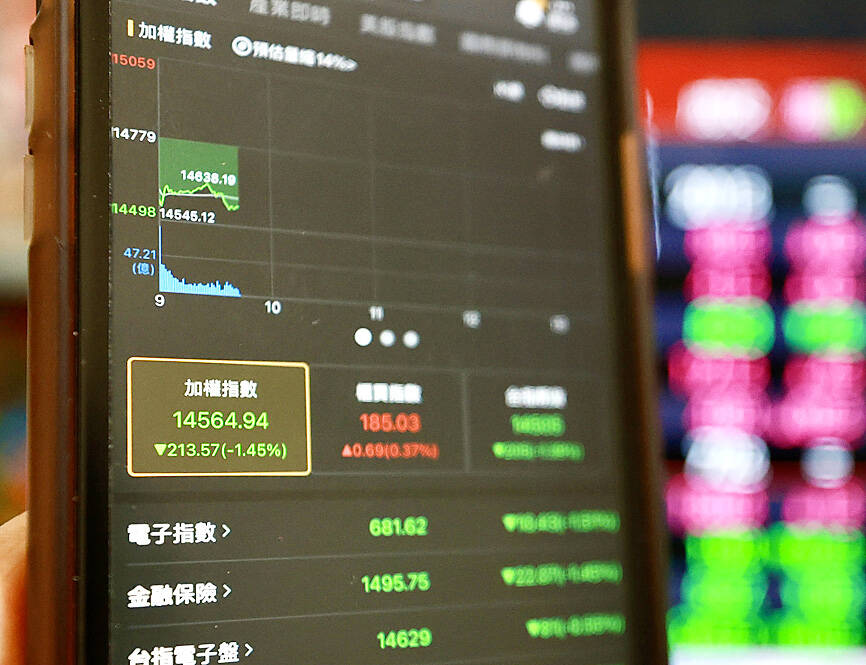Taiwanese shares came under pressure yesterday, as selling was sparked by losses suffered by tech stocks on Wall Street last week, while buying rotated to the tourism sector due to the easing of border controls.
The TAIEX ended down 221.64 points, or 1.50 percent, at 14,556.87. Turnover on the main board totaled NT$198.444 billion (US$6.4 billion), with foreign institutional investors selling a net NT$10.77 billion of shares, Taiwan Stock Exchange data showed.
“After the nine-in-one local elections on the weekend, many investors shifted their attention back to the fundamentals,” Concord Capital Management Corp (康和投顧) analyst Lu Chin-wei said. “Worries have re-emerged over inventory adjustments in the global semiconductor industry, with many investors punishing large tech stocks throughout the session today.”

Photo: CNA
Taiwan Semiconductor Manufacturing Co (台積電), the most heavily weighted stock on the local market, tumbled 3.51 percent to close at the day’s low of NT$480.5. The stock’s losses contributed more than 140 points to the TAIEX’s fall.
An escalation of protests in China against the government’s “zero COVID-19” policy also weighed on the local market as many investors feared that the unrest would hinder production and hurt demand in the world’s second-largest economy, leading to selling of export-oriented tech stocks in Taipei, Lu said.
Local election results might only impact markets for a day, Uni-President Assets Management Co (統一投顧) chairman Li Fang-kuo (黎方國) said, adding that “we are still positive on the outlook of stocks, as TAIEX usually rises in December.”
The old economy stocks mostly moved in a narrow range throughout the session, while the tourism sector attracted strong buying, jumping by 2.48 percent, on hopes that the easing of pandemic border controls would push up the number of arrivals and boost revenue.
The New Taiwan dollar lost NT$0.107 to close at NT$31.012 against the US dollar in Taipei trading yesterday.
The local currency, which has risen more than 4 percent this month, would probably weaken to about NT$33 against the greenback by the end of the first quarter, Mizuho Bank Ltd and RBC Capital Markets forecast, as overseas shipments shrink for a second straight month. The outlook isn’t bright with a global recession looming and big tech shedding jobs, while COVID-19 infections rise in China — the biggest trading partner of Taiwan's export-reliant economy.
Goldman Sachs Group Inc also said this month it’s underweight on the NT dollar as geopolitical risks could lead to foreign selling of Taiwanese shares.
Despite its recent rebound, the NT dollar is down more than 10 percent this year — set for its steepest slide since 1997 — given a widening rate differential with the US.
The central bank hiked interest rates by only 50 basis points this year, among the smallest in Asia, even as the US Federal Reserve raised interest rates by 375 basis points. Taiwanese policymakers are next to decide on rates on Dec. 15.
“We expect the Taiwan dollar to revert to 32 to 33 level in the medium term, as the recession will dampen demand for Taiwan’s electronic exports,” Mizuho Bank foreign exchange strategist Ken Cheung (張建泰) said. “The central bank’s rate hike pace will also lag the Federal Reserve’s rate hike cycle, and the currency will stay soft compared to its peers.”

NEW IDENTITY: Known for its software, India has expanded into hardware, with its semiconductor industry growing from US$38bn in 2023 to US$45bn to US$50bn India on Saturday inaugurated its first semiconductor assembly and test facility, a milestone in the government’s push to reduce dependence on foreign chipmakers and stake a claim in a sector dominated by China. Indian Prime Minister Narendra Modi opened US firm Micron Technology Inc’s semiconductor assembly, test and packaging unit in his home state of Gujarat, hailing the “dawn of a new era” for India’s technology ambitions. “When young Indians look back in the future, they will see this decade as the turning point in our tech future,” Modi told the event, which was broadcast on his YouTube channel. The plant would convert

‘SEISMIC SHIFT’: The researcher forecast there would be about 1.1 billion mobile shipments this year, down from 1.26 billion the prior year and erasing years of gains The global smartphone market is expected to contract 12.9 percent this year due to the unprecedented memorychip shortage, marking “a crisis like no other,” researcher International Data Corp (IDC) said. The new forecast, a dramatic revision down from earlier estimates, gives the latest accounting of the ongoing memory crunch that is affecting every corner of the electronics industry. The demand for advanced memory to power artificial intelligence (AI) tasks has drained global supply until well into next year and jeopardizes the business model of many smartphone makers. IDC forecast about 1.1 billion mobile shipments this year, down from 1.26 billion the prior

People stand in a Pokemon store in Tokyo on Thursday. One of the world highest-grossing franchises is celebrated its 30th anniversary yesterday.

Zimbabwe’s ban on raw lithium exports is forcing Chinese miners to rethink their strategy, speeding up plans to process the metal locally instead of shipping it to China’s vast rechargeable battery industry. The country is Africa’s largest lithium producer and has one of the world’s largest reserves, according to the US Geological Survey (USGS). Zimbabwe already banned the export of lithium ore in 2022 and last year announced it would halt exports of lithium concentrates from January next year. However, on Wednesday it imposed the ban with immediate effect, leaving unclear what the lithium mining sector would do in the